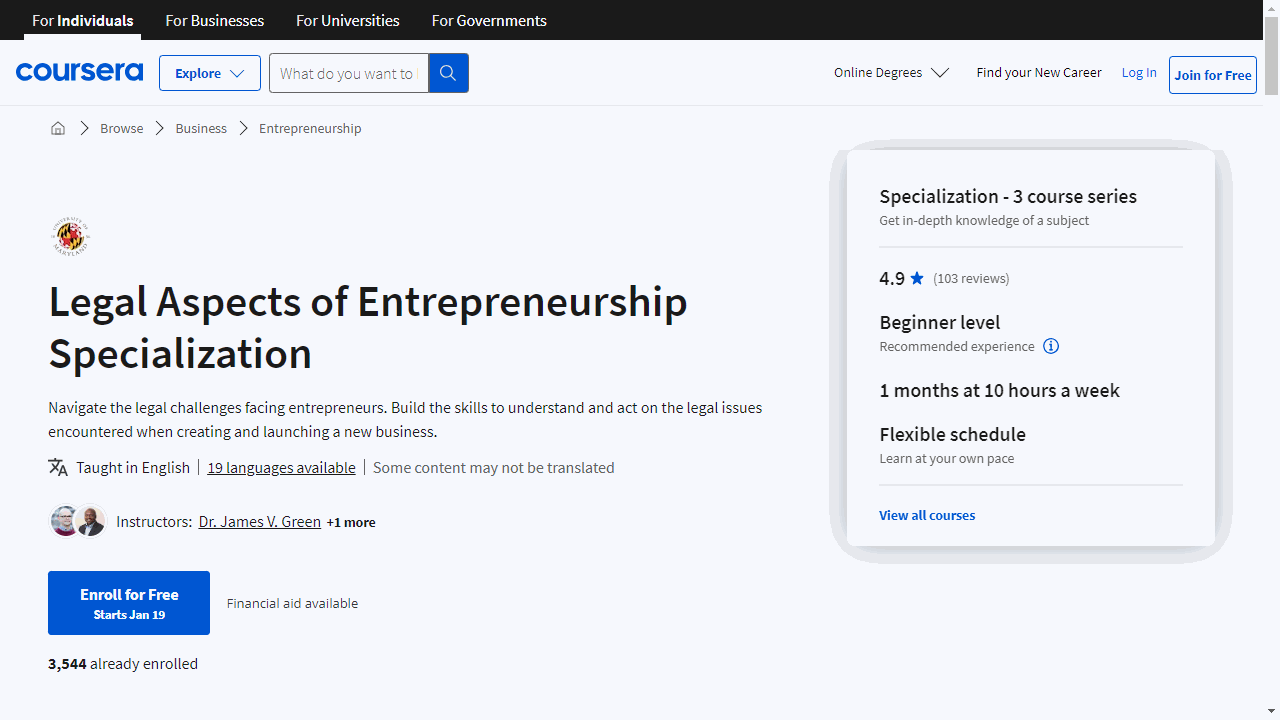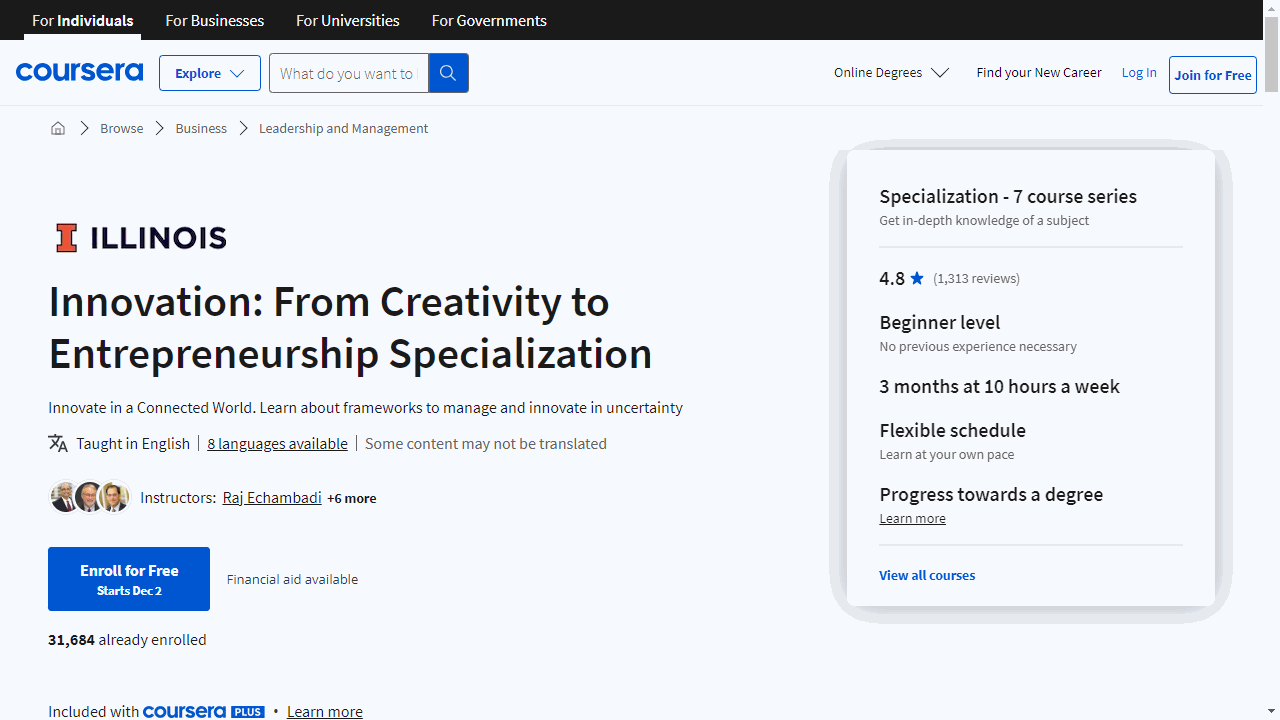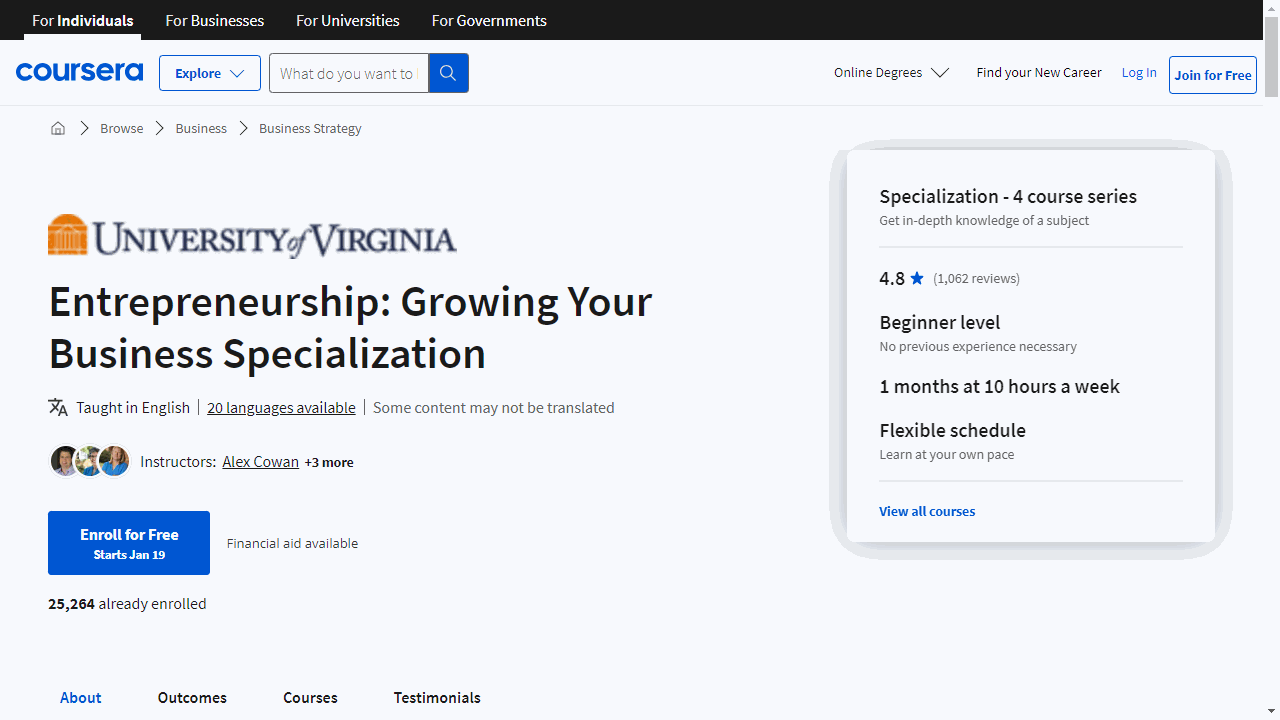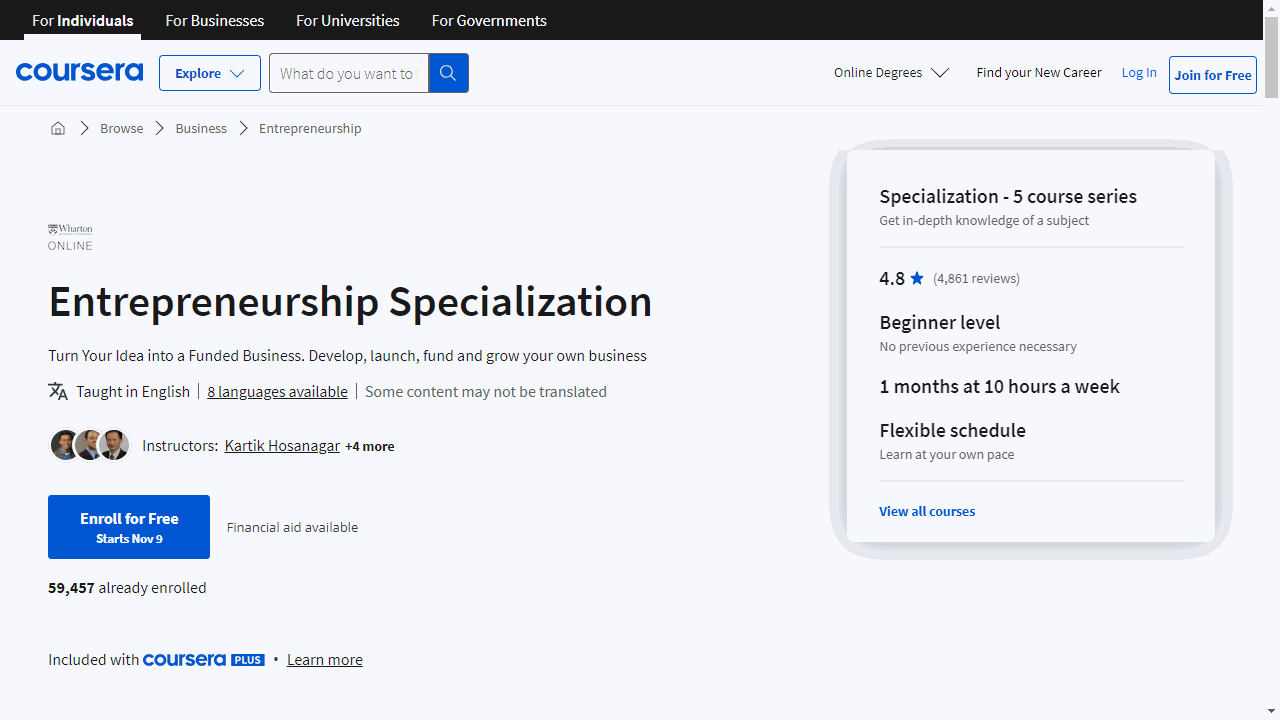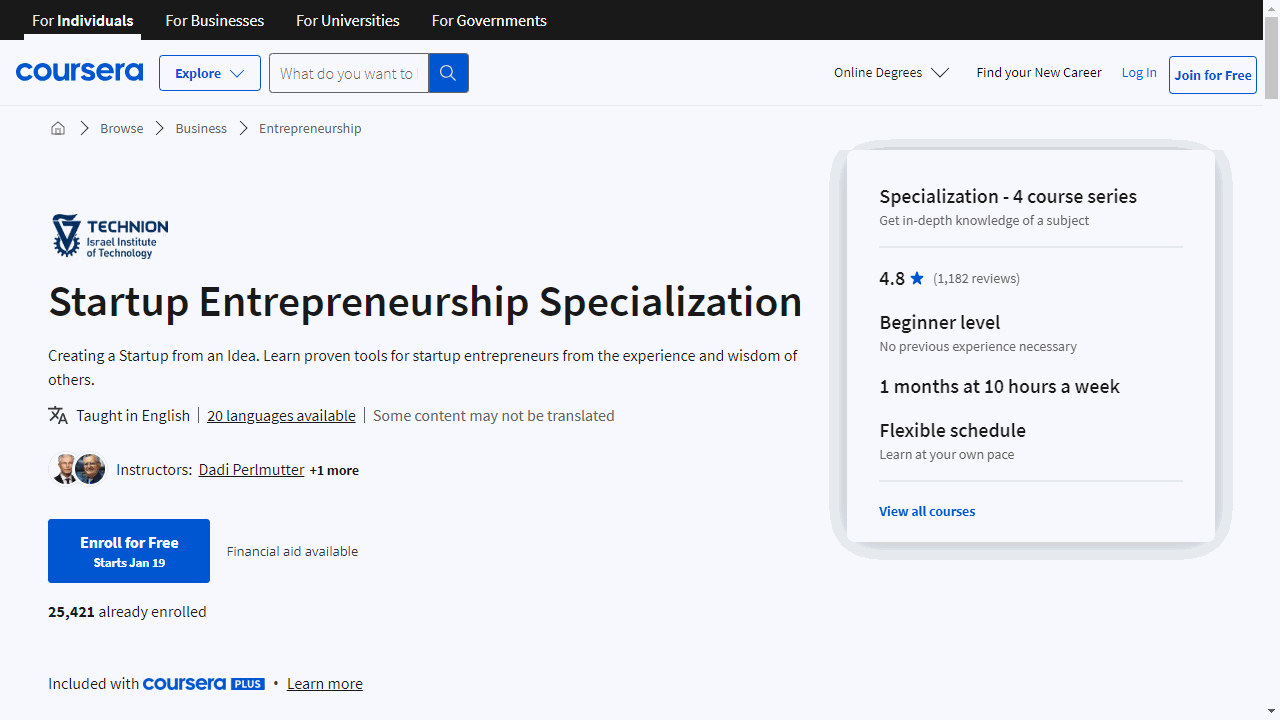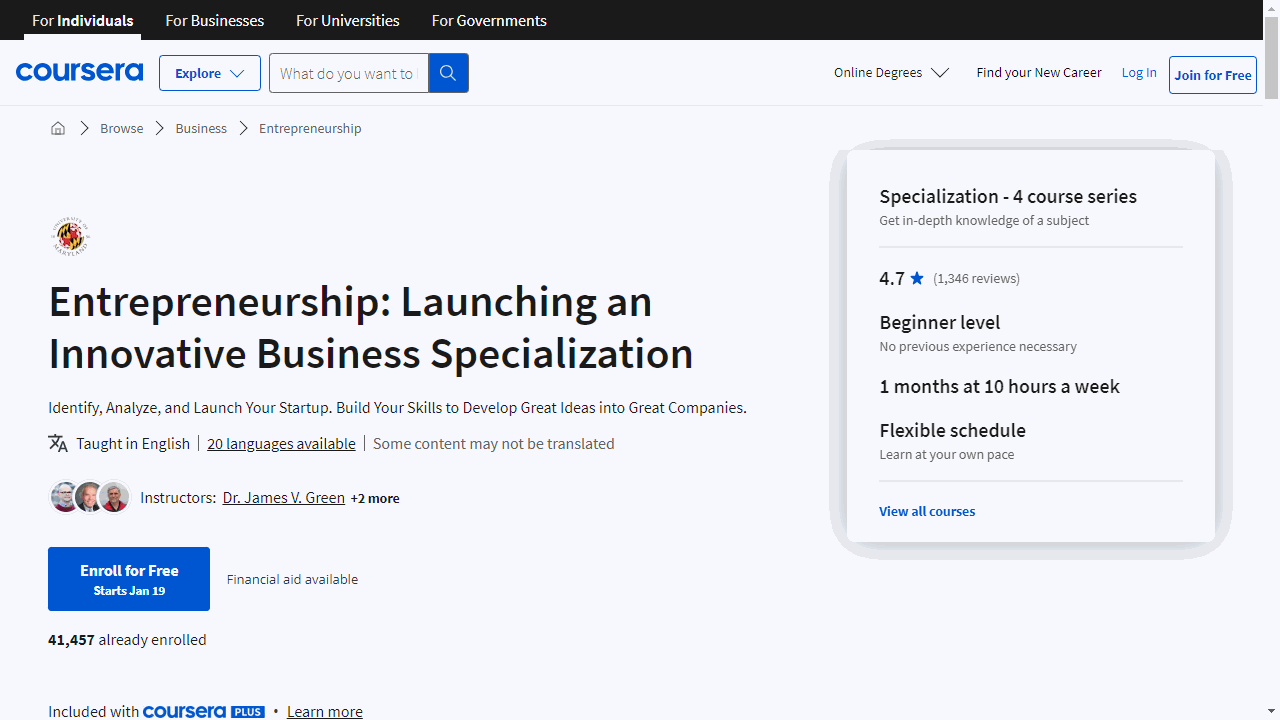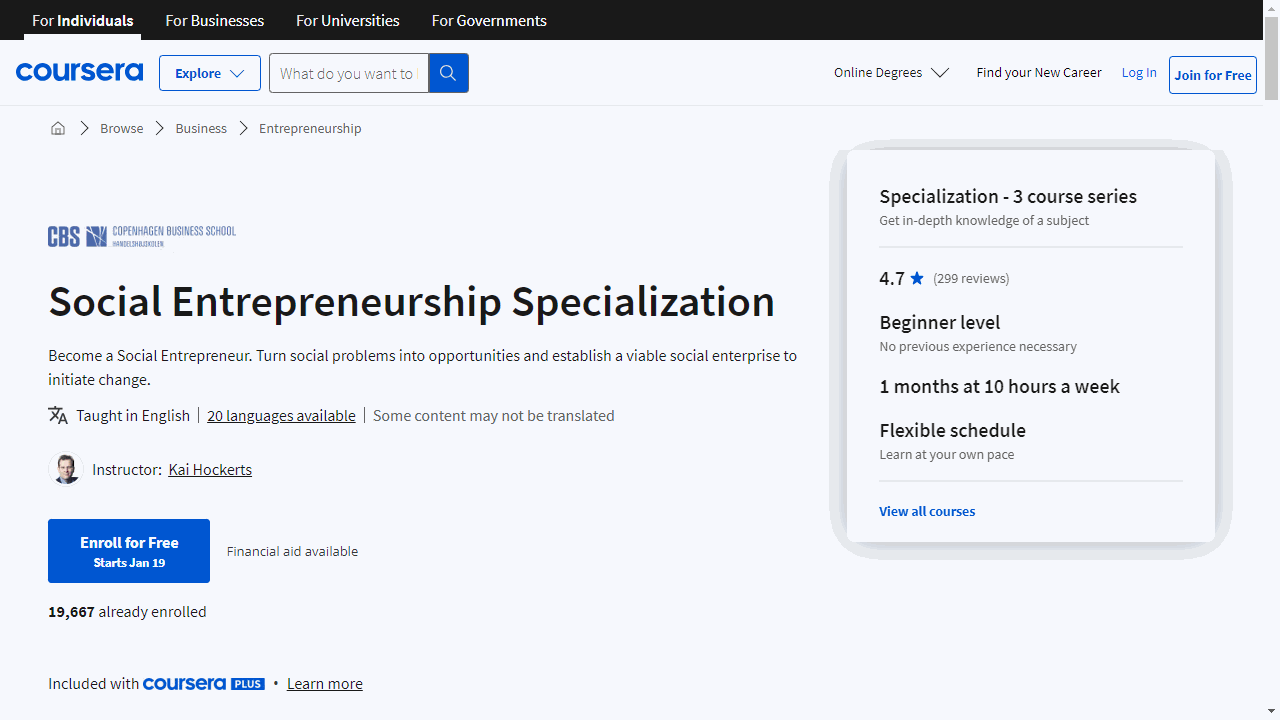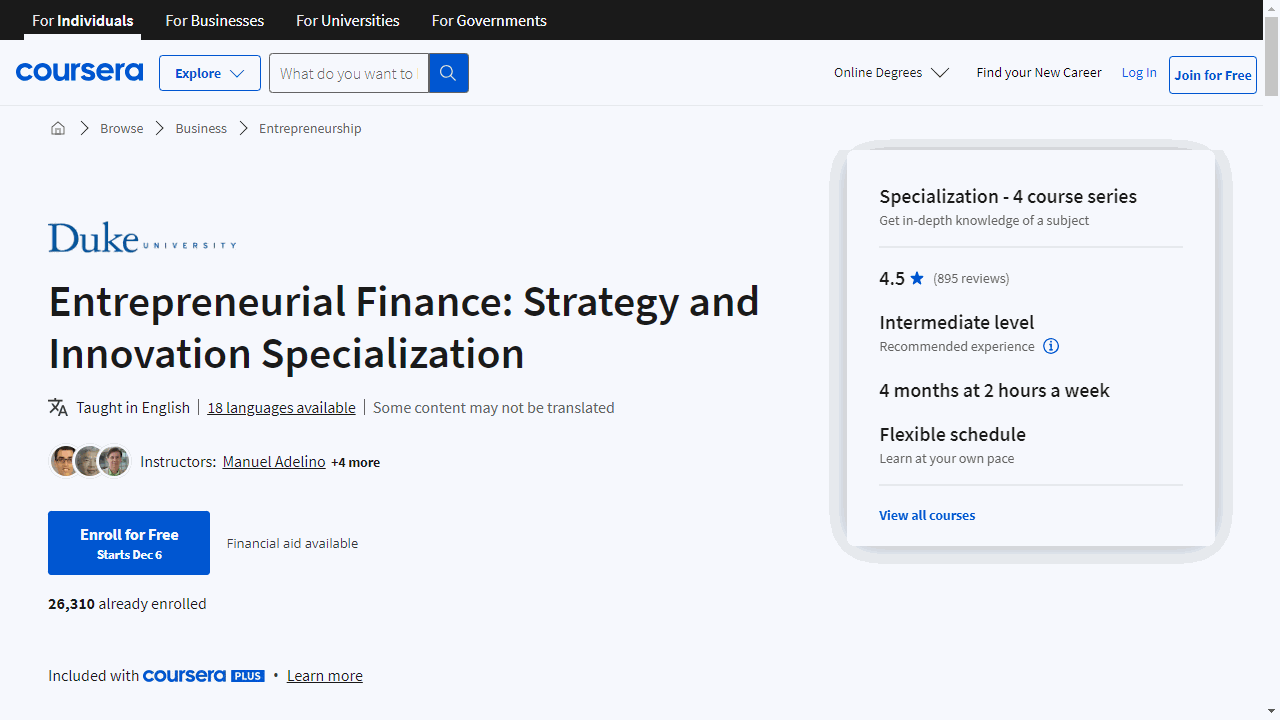Legal Aspects of Entrepreneurship Specialization
Provider: University of Maryland, College Park
By focusing on practical skills like business law, intellectual property management, and contract negotiation, these courses prepare you to tackle the legal challenges entrepreneurs face.
In “Legal Foundations for Entrepreneurs,” you’ll grasp how the law shapes your entrepreneurial journey.
You’ll learn when to tackle legal tasks yourself and when to seek an attorney’s help.
This course demystifies business formation, simplifies employment law, and prepares you for the legal ins and outs of business operations.
Dive into “Intellectual Property for Entrepreneurs” to protect your most valuable assets—your ideas.
You’ll understand what qualifies for a patent, how to manage copyrights, and the importance of trademarks.
This course empowers you to safeguard your innovations, ensuring your intellectual property remains your own.
“Legal Contracts and Agreements for Entrepreneurs” equips you with the know-how to navigate contracts confidently.
You’ll discover how to draft, assess, and negotiate agreements that are crucial for your business’s success.
Plus, you’ll learn the legalities of raising capital, helping you make informed decisions about venture financing.
Innovation: From Creativity to Entrepreneurship Specialization
This specialization is offered by the University of Illinois at Urbana-Champaign.
In “Strategic Innovation: Building and Sustaining Innovative Organizations,” you’ll master the art of creating value through innovation strategy.
This course equips you with the know-how to use technology for competitive advantage, protect your innovations, and navigate strategic decisions confidently.
“Strategic Innovation: Managing Innovation Initiatives” takes you further, focusing on implementing innovation within established organizations.
You’ll tackle the challenges of disruptive technologies and learn to lead teams and manage innovation projects effectively.
“Creativity Toolkit I: Changing Perspectives” unlocks your creative potential.
It teaches you to view challenges from new angles, fostering creativity in yourself and others.
This course is about turning creative thinking into actionable innovation.
Building on creative skills, “Creativity Toolkit II: Creative Collaboration” emphasizes teamwork.
You’ll learn to pitch ideas persuasively, assess others’ concepts critically, and cultivate a collaborative environment where creativity thrives.
For budding entrepreneurs, “Entrepreneurship I: Laying the Foundation” covers the essentials of starting a venture, from understanding growth dynamics to identifying opportunities that shape entrepreneurial success.
“Entrepreneurship II: Preparing for Launch” prepares you for the realities of launching a business.
You’ll craft strategies for team building, customer engagement, financial planning, and securing investment, ensuring your startup is ready for growth.
The capstone project integrates your learning, challenging you to apply your skills to analyze and develop business models for new ventures, identifying opportunities and addressing potential challenges.
Each course offers practical skills and insights, with the added benefit of potentially contributing to a degree from the Gies College of Business if you choose to pursue further education.
Entrepreneurship: Growing Your Business Specialization
Provider: University of Virginia
Dive into “Financial Accounting Fundamentals” to understand the financial health of a business.
You’ll learn to record transactions, prepare financial statements like the Balance Sheet and Income Statement, and analyze cash flows.
This course equips you with the ability to make informed financial decisions.
With “Ethical Leadership Through Giving Voice to Values,” you’ll learn to navigate ethical dilemmas in business.
It’s not just about knowing what’s right; it’s about having the courage and skills to act on your values.
This course empowers you to lead with integrity and confidence.
“New Models of Business in Society” shifts your perspective on profit and purpose.
You’ll explore how businesses can create value for a broader set of stakeholders, including society and the environment, while still being profitable.
This course encourages you to think beyond traditional business models and embrace concepts like corporate responsibility and sustainability.
Lastly, “Innovating with the Business Model Canvas” offers a dynamic approach to business planning.
Forget lengthy documents; the Business Model Canvas helps you visualize and test your business strategy on a single page.
You’ll apply design thinking and Lean Startup techniques to innovate and adapt your business model effectively.
By focusing on these key areas—accounting, ethical leadership, stakeholder value, and business model innovation—you’ll be well-equipped to grow your business.
Each course, rooted in the expertise of Darden School faculty, is designed to provide actionable insights and real-world applications.
Entrepreneurship Specialization
“Entrepreneurship 1: Developing the Opportunity” is where it all begins.
This course demystifies the concept of entrepreneurship and helps you understand if you have what it takes to be an entrepreneur.
You’ll learn to distinguish a viable business opportunity from a mere idea, test assumptions, and build a prototype.
It’s a practical foundation that sets the stage for your entrepreneurial journey.
As you progress to “Entrepreneurship 2: Launching your Start-Up,” you’ll transition from idea to action.
This course equips you with the tools to establish a scalable business model.
You’ll delve into the lean start-up methodology, learn when to pivot, and understand the intricacies of team management and equity allocation.
It’s about turning your validated idea into a structured business ready to enter the market.
In “Entrepreneurship 3: Growth Strategies,” the focus shifts to expansion. Growth is crucial, but it must be managed wisely.
This course covers key marketing strategies, including digital marketing and SEO, and provides insights into building sales processes and partnerships.
You’ll also explore talent acquisition and retention. It’s designed to help you scale your business effectively.
“Entrepreneurship 4: Financing and Profitability” addresses the financial aspect of running a start-up.
You’ll explore various financing options, understand equity financing, and learn about investor expectations.
This course aims to prepare you for the financial challenges of entrepreneurship and guide you towards a profitable business model.
The “Wharton Entrepreneurship Capstone” is the culmination of your learning experience.
Here, you’ll apply everything you’ve learned by creating a pitch deck for a new venture.
You’ll receive peer feedback and practice evaluating pitches, gaining a perspective on what investors look for in potential investments.
Each course is designed to build on the previous one, ensuring a logical progression of skills and knowledge.
You’ll gain insights into venture capital, strategic management, and more, all while learning from experienced entrepreneurs and business experts.
Startup Entrepreneurship Specialization
Provider: Technion - Israel Institute of Technology
Throughout this specialization, you’ll sharpen your skills in strategic and operations management, learn to navigate the entrepreneurial ecosystem of Israel, and beyond, and understand how to differentiate your product in the market.
Dive into “Cracking the Creativity Code: Discovering Ideas” to unlock your creative potential.
You’ll master the ‘Zoom in, Zoom out, Zoom in’ method, a structured approach to generating and implementing groundbreaking ideas.
This course isn’t just about ideation; it’s about execution.
You’ll apply your skills to real-world challenges and learn to lead the innovation process from start to finish.
With “From Idea to Startup,” you’ll move from concept to creation.
This course equips you with tools to evaluate your ideas, develop a winning strategy, and craft a compelling value proposition.
You’ll gain insights from entrepreneurs through on-site interviews, and use these lessons to build a business plan that’s both flexible and actionable.
In “Innovation Career Lessons from a Master,” you’ll absorb wisdom from Dadi Perlmutter, a former Intel executive with a track record of disruptive innovation.
His 10 life lessons will guide you through the complexities of strategic management and teach you to simplify your ideas for maximum impact.
You’ll learn to build a team, foster an ecosystem for innovation, and effectively communicate your vision.
The capstone, “Action-Driven Business Plan: From the ‘Classroom’ to the World,” is where your learning culminates.
Over six weeks, you’ll meticulously develop your business plan, incorporating elements like market analysis, unique features, and future developments.
You’ll create a Gantt chart, outline a project budget, and distill your business concept into a persuasive two-minute video.
Entrepreneurship: Launching an Innovative Business Specialization
Provider: University of Maryland, College Park
Dive into “Developing Innovative Ideas for New Companies: The First Step in Entrepreneurship” to transform your concept into a viable business.
You’ll master the art of spotting opportunities, fostering an entrepreneurial mindset, making strategic decisions, and designing business models that stand out.
Move forward with “Innovation for Entrepreneurs: From Idea to Marketplace,” where you’ll navigate the journey of bringing your innovation to the public.
Discover how to identify market opportunities, take crucial steps to commercialize your idea, and craft strategies to maintain a competitive edge.
When it’s time to talk funding, “New Venture Finance: Startup Funding for Entrepreneurs” has you covered.
Learn the essentials of finance, understand how to value your company, explore various funding stages, and perfect your investor pitch to secure the capital you need.
Cap it all off with the “Entrepreneurship Capstone,” where you’ll apply everything you’ve learned to either enhance an existing business plan or create a new one.
You’ll develop a customer-validated business model and prepare an investor pitch that resonates.
Throughout these courses, you’ll gain practical skills in opportunity identification, management, innovation, market research, and business modeling.
You’ll also become savvy in venture capital, understanding term sheets, and the capital structure of new ventures.
Social Entrepreneurship Specialization
Provider: Copenhagen Business School
This program is a practical journey through the creation and development of a social venture.
Kick off with “Identifying Social Entrepreneurship Opportunities” to dive into the core of social entrepreneurship.
You’ll learn to identify and understand social problems, and how to use assets to spot and seize opportunities for social change.
This course encourages you to form a team and select a social issue to address, laying the groundwork for your future social enterprise.
Next, “Social Business Model and Planning for Social Innovation” takes your identified opportunity to the next level.
You’ll craft a robust business model with the Business Model Canvas and begin drafting a compelling business plan.
This course also guides you in choosing the right organizational structure and funding strategy, essential for your venture’s success.
It’s best to complete the first course before starting this one to build on your knowledge.
The third course, “Unleashing the Impact of your Social Enterprise,” teaches you to assess and communicate the social impact of your enterprise effectively.
You’ll learn to market your products or services and explore strategies for growth, including social franchising and international expansion.
Plus, you’ll consider various exit strategies for when it’s time to scale up.
Your learning culminates in a Capstone project where you’ll submit your social venture’s business plan.
By the end of this specialization, you’ll have developed skills in asset management, income generation, project planning, and more.
You’ll be equipped to launch a social enterprise that not only thrives financially but also drives meaningful change.
Entrepreneurial Finance: Strategy and Innovation Specialization
This specialization is offered by Duke University.
It equips you with essential financial knowledge tailored for the startup environment and the evolving landscape of financial technology.
Prior knowledge of R is recommended to fully benefit.
In “Startup Valuation Methods,” you’ll master the art of determining a startup’s worth through practical Excel exercises, focusing on discounted cash flow analysis.
This course demystifies the valuation process and introduces you to various investment securities, preparing you to make informed decisions about potential deals.
“Financing for Startup Businesses” guides you through creating capitalization tables in Excel, a crucial tool for visualizing your startup’s financing options.
You’ll explore innovative digital financing methods, including crowdfunding and web-based credit scoring.
The course concludes with insights into fintech’s impact on traditional credit evaluation.
“Blockchain Business Models” offers a comprehensive look at blockchain technology beyond cryptocurrencies.
You’ll discover its applications in diverse areas such as supply chain management and secure voting, learning to identify opportunities for blockchain integration and assess associated risks.
Lastly, “Financial Risk Management with R” sharpens your ability to quantify and manage investment risks.
Utilizing R programming, you’ll calculate portfolio returns and employ techniques like Value-at-Risk and Expected Shortfall.
